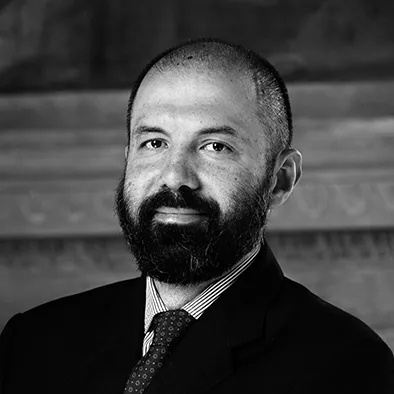Giorgio
Prodi

ITALY Associate Professor of Applied Economics University of Ferrara Visiting Faculty
Giorgio Prodi is an associate professor in applied economics at the University of Ferrara, Department of Economics and Management. In BBS he is Director of Asia and Pacific relations and Director of the MBA Hybrid in English. He graduated from the University of Bologna in Economics and then obtained a Masters in Economics from the London School of Economics and Political Science. He has a PhD in Economics and Institutions from Bologna University. He spent one of his three years of his doctorate program as a visiting student at Harvard University. He teaches industrial economics, game theory for business strategy and Chinese economy. His research activities can be divided into 2 macro areas: the study of structural changes in the manufacturing sectors and the Chinese economy with particular focus on the impact it has on Italian companies. On these topics he has published articles in international journals such as the Cambridge Journal of Economics, Journal of Evolutionary Economy, Scientific Reports, international Review of Economics and Finance. In addition to research, he carries out consultancy activities and he is a member of the Board of Directors of some manufacturing companies. He is a partner and member of the board of TWAI (Turin World Affairs Institute) and of the GEI (Gruppo Economisti d’Impresa).
COURSES
This course describes the EU and Far East industrial structures and underlines the main opportunities they are offering today as far as industrial investments are concerned. European investments in Asia and Asian Investments in Europe will be deeply analyzed emphasizing opportunities and difficulties.
This cycle of seminars constitutes a unique occasion for the MBA students to meet and interact with key leaders of the global economic, social and political scene. These series of lectures, especially designed for the MBA class, reflects the main goal of the Program, which is to link theories and practice.
In this course we will focus on how changes in geopolitical and geoeconomical equilibria may change business strategies. Trilateral relations between Europe, US and China will be the core of our analysis whit a special focus on the role that China is playing on international markets.
Students will be asked to read and discuss papers, book chapters and journal articles.
Hybrid MBA English EditionThe course is divided into 10 hours of lectures and three one-month corporate projects.
LECTURES: Goal of these lectures is to analyze the role of China as a new focal point in the world economy. We will start focusing on how changes in geopolitical and geoeconomical equilibria may change business strategies. Trilateral relations between Europe, US and China will be the core of our analysis. Internationalization strategy must take into account macro and micro economic variables and policy variables.
COMPANY PROJECTS: The course also includes three business projects, each lasting one month, focused on internationalization initiatives in the various emerging markets covered in the Global and Emerging Markets track. The project work is carried out in groups of 4–5 participants and begins with a company presentation by a manager from a partner firm within the School’s network, who then sets the project topic for the groups. During each project, participants work under the guidance of a tutor, who provides ongoing support to develop a project with appropriate content and methodology. At the end of the month, a meeting is held with the company’s management, during which the participants present their work. Evaluation is conducted jointly by the faculty and the company management, with the aim of assessing both the originality of the proposed managerial solutions and their practical feasibility and potential implementation in a real business context.
Business Management – Global and Emerging Markets